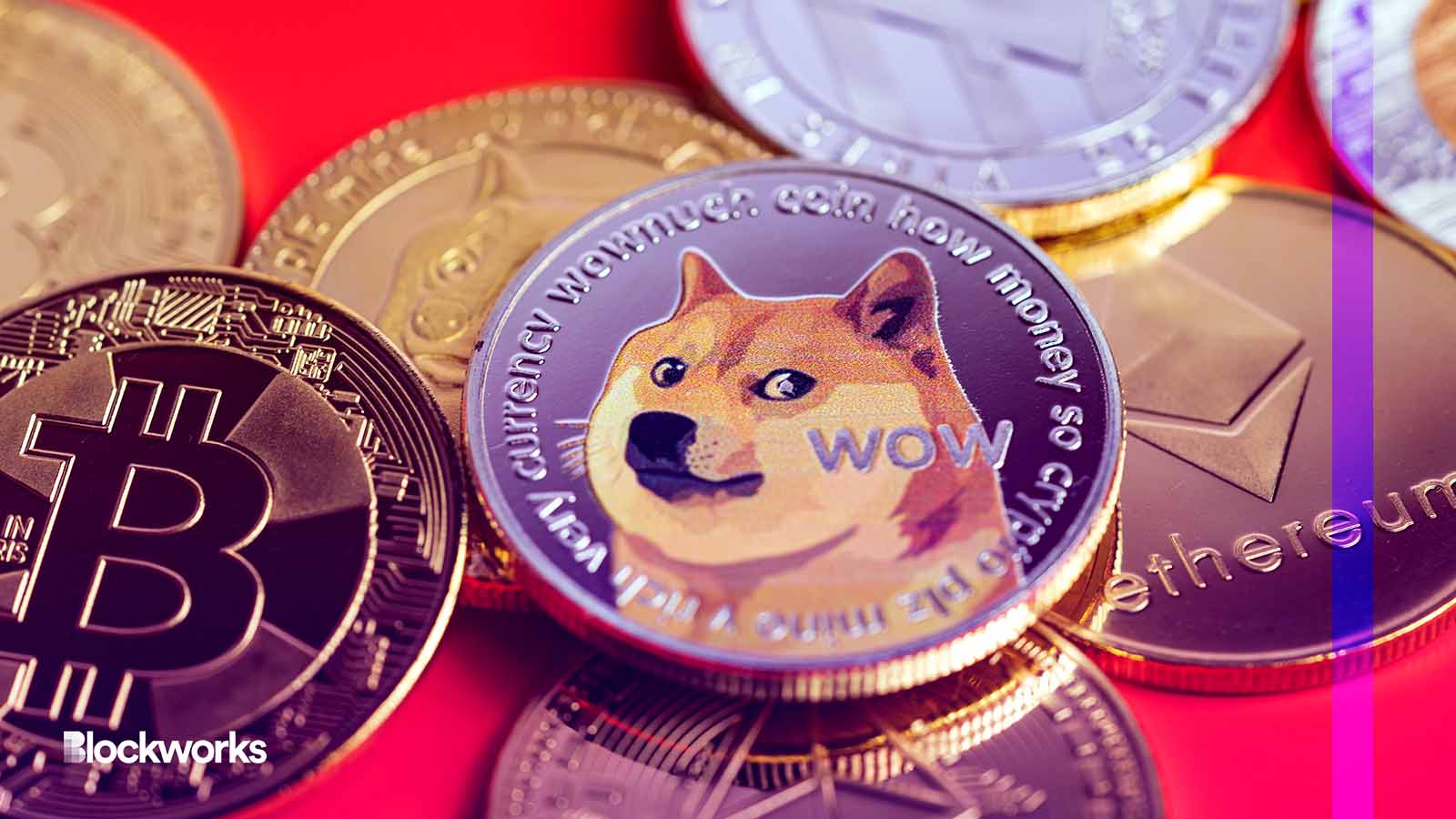Dogecoin Proves It’s a Serious Blockchain, Flips Ethereum Transaction Count
Dogecoin is handling more transactions than both Ethereum and Bitcoin — with drastically lower fees

BBbirdZ/Shutterstock modified by Blockworks
Dogecoin is undergoing a surge in network spam so dramatic that it’s now processing more transactions than the Ethereum blockchain.
Over the past week, the memecoin network handled more than 7.9 million transactions, up nearly 11% on Ethereum’s 7.2 million and more than double Bitcoin’s count.
Not bad for a chain that has handled only 30,000 daily transactions on average since 2015 — less than 5% of Ethereum’s.
The culprit is Bitcoin Ordinals. Or more precisely, opportunistic crypto fans eager to capitalize on the inscriptions hype.
Bitcoin Ordinals aren’t exactly the same as the NFTs you might find on Ethereum or Solana. Those non-fungible tokens are minted via smart contract and adhere to their own token standards enforced by wallets, marketplaces and other key infrastructure across Web3.
Ordinals are instead defined by data “inscribed” into individual satoshis (sats for short). Sats are BTC’s smallest denomination: 0.00000001 BTC currently worth $0.00027. A craft developer recently figured out how to forever imbue sats with special properties, such as enough data to render a JPEG or DOOM clone.
BRC-20 tokens — a play on Ethereum’s ERC-20 standard for run-of-the-mill tokens — quickly followed Ordinals. Hype for Bitcoin-powered altcoins and collectible sats triggered a renaissance for blockspace demand, driving up fees while pushing transaction counts and mempool backlogs to record highs.
If we consider Ordinals in the same genre of digital asset as Bored Apes, Bitcoin is now the number-two blockchain for NFTs behind Ethereum.
Doge see, Doge do
Due to similarities between Bitcoin and Dogecoin (a code fork of a code fork of Bitcoin), it didn’t take long for developers to code methods for minting Dogecoin tokens in much the same way as Ordinals and BRC-20s — except with a “D” instead of a “B.”
But Bitcoiners have multiple platforms on which traders can swap Ordinals and BRC-20s, including crypto exchange wallets. Dogecoin doesn’t.
Bitcoin’s BRC-20s in particular have been helped by an experimental token standard, something akin to Ethereum’s ERC-20s.
The standard set enough technical parameters so that infrastructure (wallets, marketplaces and the like) can facilitate trading and whatnot without running into headaches, like duplicate listings and overtly broken code.
BRC-20 and Ordinals individually have recently made up more than half of all Bitcoin transactions, and it’s unclear just how many DRC-20-related transactions are flowing through Dogecoin right now. No tools have been built to sort DRC-20 outputs from others, which makes it difficult to quantify exactly how many Dogecoin tokens are being minted every minute.
In any case, it’s surely an impressive chunk. Multiple DRC-20 token transactions are found in practically every single block right now (which occur every one minute on average). They are easy to spot, as they usually come with a 0.001 DOGE fee attached ($0.000071).
Pseudonymous Dogecoin developer inevitable360 told Blockworks that they classify DRC-20 transactions like these as spam because anyone can clone or replicate the exact same token.
Unlike Bitcoin and Ethereum, there is no DRC-20 token standard for Dogecoin. So, many tokens are being minted under the same name, making it practically impossible to form a legitimate market around them.
There’s still legitimate Dogecoin activity alongside speculators minting Dogecoin tokens via the one or two wallets that support them in their current form (which have been caught boosting fees to apparently profit from the hype).
The median transaction value is nearly 77 DOGE ($5.46). If DRC-20s were truly the overwhelming majority, then that figure would be far lower.
 Bitcoin Ordinals already have their own marketplaces
Bitcoin Ordinals already have their own marketplacesIt might be spam, but it’s honest work
For what it’s worth, much of the recent Bitcoin activity has also been labeled spam: effectively worthless transactions with no reason to exist but to exist; abundant purely because creation is cheap and the potential payoff is large.
Granted: Ethereum layer-2 networks such as Arbitrum and Optimism are each processing tons of transactions. More than a million per day for the former, in fact. If we add those in with Ethereum, then the blockchain dominates Dogecoin by far.
Ethereum fees are also high right now. High enough to apparently dissuade a portion of useless trade, particularly NFTs. But there’s something to be said for Dogecoin in this instance.
Many deride Dogecoin as a joke carefully crafted to trap crypto newbies into gambling on memecoins during bull runs.
There may be some element of truth to that. But historically, Dogecoin has served as a lucrative alternative for bitcoin miners at times when mining BTC was simply not profitable. An unsung hero, in those cases.
Dogecoin is also merge-minable with Litecoin, allowing miners to share hash rate between the two to provide some element of flexibility in support of a multichain future. It just so happens that right now, there appears to be more activity tied to DRC-20 speculation today than that tied to the use of Ethereum mainnet overall.
And Dogecoin still has lower median fees: $0.00096 compared to Ethereum’s $3.13 — no doubt an uncomfortable fact for many ETH fans.
Get the news in your inbox. Explore Blockworks newsletters:
- The Breakdown: Decoding crypto and the markets. Daily.
- 0xResearch: Alpha in your inbox. Think like an analyst.






